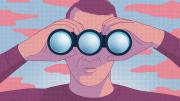Professor of psychology Ellen Langer once received an invitation to deliver a sermon. Although she is “not particularly religious,” she agreed to offer a reflection at the service, choosing a topic at the intersection of religion and psychology: forgiveness. As she prepared her remarks, Langer began thinking about the human tendency to assume that one way is better than another. For instance, forgiveness is universally seen as positive, and blame as negative. “However, when you look more closely at it, you can’t forgive unless you first blame,” she explains. “Everyone says blame is bad, but our forgivers are exactly the same people as our blamers.” From there she began to consider that making an effort to understand why people act a particular way is potentially even better than forgiving or blaming them. This fit with her long-standing belief that “a person’s action makes sense from their perspective, or else they wouldn’t have done it.”
These insights led Langer to a recent project with Philip Maymin, professor of analytics in the Fairfield University Dolan School of Business, which they call “Better Than Better.” Their work explores the benefits of breaking away from what they see as limiting false dichotomies, such as forgiveness versus blame, in search of “a higher third way.” For example, Langer offers the concept of “trying,” which is typically seen as better than “not trying, or giving up.” “We have collected data from many countries around the world on this, where people are told to try to do a task or they are told to just do it,” Langer explains. “If someone thinks they can’t do something and you say, ‘Try,’ that’s better than not trying. Giving up is not good. But doing is better than trying.” Her research shows that people instructed to “do” a series of math problems solve more than people asked to “try.” The concept of trying, she notes, has the possibility of failure built into it.
The instinct to limit oneself to choice A (try) or choice B (give up) is common, but reductive. As part of her decades-long research into mindfulness (which she defines as “simply the active process of noticing new things”), Langer has been studying the potential of considering a given concept in multiple ways—and finding out that mild, mindfulness-inducing interventions can have important consequences.
“Over 40 years of research, we’ve found this act of noticing is literally and figuratively enlivening,” she says. In a now famous study of the impact of shifting frames of reference, Langer had a retreat house retrofitted with furnishings and media from 20 years earlier, and asked elderly men to live there for a week as if they were 20 years younger, speaking in the present tense about the past. Langer found that their hearing improved, their vision improved, their memory and strength improved, and they looked noticeably younger, all without medical intervention (see “The Mindfulness Chronicles,” September-October 2010, page 42). In another study, she and a student showed one group of hotel workers that their room-cleaning jobs were actually exercise, an idea that was new to them. Within a month, relative to a control group, those workers lost an average of two pounds each, lowered their blood pressure by 10 points, and reduced their waist-to-hip ratio without changes in diet or workout. “It was all due to their simple change in mindset,” Langer explains, “now seeing ‘work’ as ‘exercise.’”
Recently, she and her team began studying how mindfulness can treat conditions including multiple sclerosis, ALS, Parkinson’s disease, and chronic pain, through projects that help subjects notice variability in their symptoms. “We call people over the course of two weeks, and we simply ask them, ‘How is it now? Is it better or worse than before, and why?’” she explains. “The first thing that happens is that people realize, for example, that they’re not in pain all the time.” The researchers then ask subjects to consider why the symptoms are greater or lesser at the moment, which initiates a mindful search that Langer sees as beneficial. If you seek a solution in that state, she says, “you’re more likely to find one.”
In another “Better Than Better” example, Langer explores the presumption that a thoughtful decision is better than an uninformed choice. “But better than both is recognizing the inherent uncertainty of all choices and making the decision right,” Langer suggests. “You’ll never be able to have all the information potentially necessary, and deciding when to stop collecting and analyzing information is a decision in itself.” She notes that the late Nobel laureate in economics Thomas Schelling once argued that there’s no rational way to choose the “perfect” microwave among the multiple options available, especially if you’ve never owned one before. The best option is simply to buy one and make the best of the model you choose. “Rather than struggle to make the right decision, what we should do is make the decision right, whatever the decision is,” Langer explains. “The common mistake people make when they suffer regret is to presume that the other alternative would have been better, and there’s no way of knowing that.”
Assigning every outcome or choice a “positive” or “negative” valence, and insisting on a single “right” answer, has contributed to the highly polarized political atmosphere in the United States, she continues. “We tend to disparage people who behave differently than we do, rather than realize that what they’re doing doesn’t tell us why they’re doing it.” Trying to understand the motivations of others—Langer’s third way—is less limiting than mindlessly declaring a given action to be positive or negative. “Whenever we are being judgmental,” she advises, “we are blind to a better way.”








